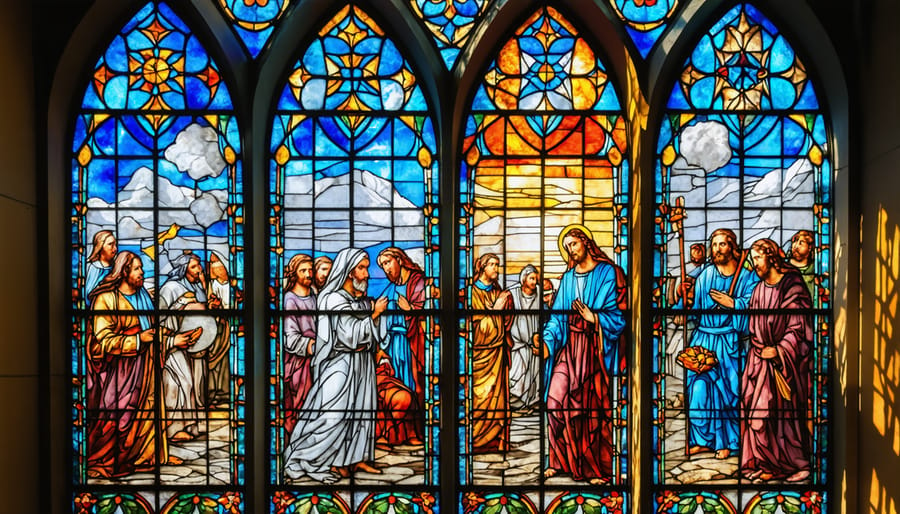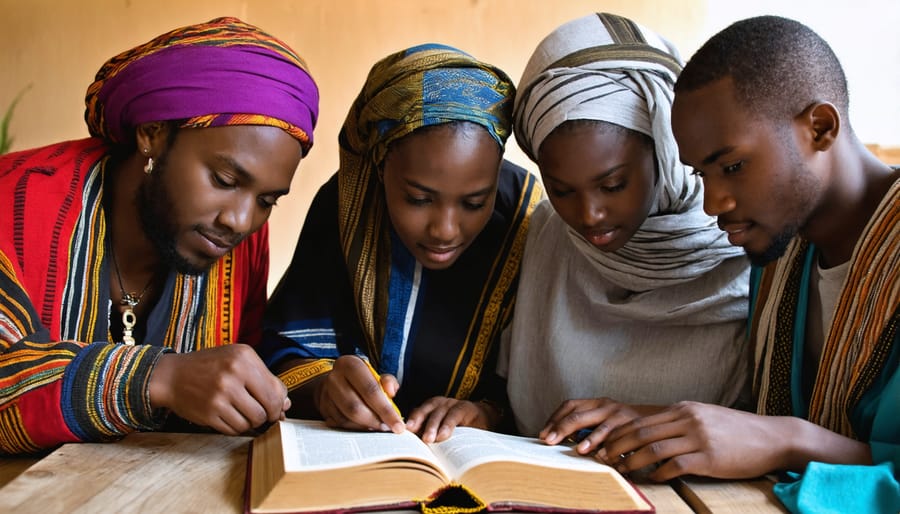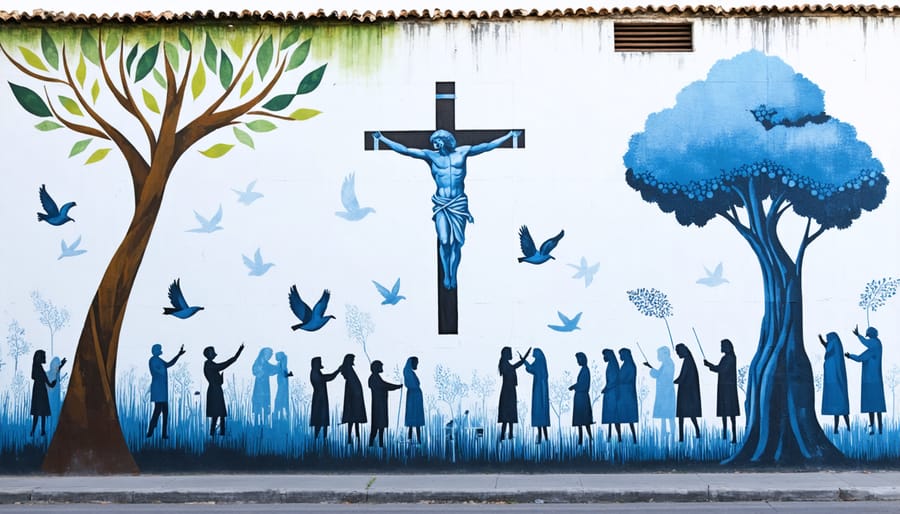Embark on a captivating journey through the kaleidoscope of global perspectives on the Bible, a sacred text that has shaped the faith and lives of billions across centuries and continents. From the ancient streets of Jerusalem to the vibrant churches of Africa, Asia, and Latin America, the Bible’s timeless message resonates in diverse Christian traditions, each offering unique insights and interpretations. Discover how cultural contexts, historical events, and linguistic nuances have influenced the way believers around the world engage with Scripture, revealing the Bible’s remarkable adaptability and universal appeal. As we explore the rich tapestry of global biblical perspectives, we uncover the unifying threads that bind us together as a worldwide community of faith, united in our shared devotion to God’s Word and its transformative power in our lives.

The Bible in Western Christianity
Catholic Perspective
The Catholic Church recognizes the Bible as the inspired word of God and the foundation of its teachings. Catholic biblical interpretation is guided by the principle of reading Scripture within the “living Tradition of the whole Church,” as stated in the Catechism of the Catholic Church. This means that the Bible is not interpreted in isolation but in light of sacred Tradition and the Magisterium (the teaching authority of the Church).
Catholic exegesis employs the historical-critical method while also considering the theological meaning of the text. The Church emphasizes the unity of Scripture, acknowledging that the Old and New Testaments are interconnected and point to the central figure of Jesus Christ. Additionally, Catholics believe in the importance of four senses of Scripture: literal, allegorical, moral, and anagogical.
The Catholic approach to the Bible has shaped its doctrine and teachings, such as the seven sacraments, the real presence of Christ in the Eucharist, and the veneration of Mary and the saints. The Church also affirms the canonicity of the 73 books in the Catholic Bible, including the deuterocanonical books, which are considered part of the inspired Scripture.
Ultimately, the Catholic perspective on the Bible emphasizes the importance of reading and interpreting Scripture in communion with the Church, allowing its timeless truths to guide the faithful in their spiritual lives.
Protestant Perspective
For Protestants, the Bible is the ultimate authority and the foundation of their faith. The Protestant Reformation, sparked by Martin Luther in the 16th century, emphasized the principle of sola scriptura, which holds that the Bible alone is the source of religious truth and the final arbiter in matters of faith and practice. This perspective led to a renewed focus on the study and interpretation of Scripture, with an emphasis on the literal and historical-grammatical interpretation of the text.
Protestants believe that the Bible is the inspired Word of God, inerrant in its original form, and sufficient for understanding God’s will and plan for humanity. They encourage personal Bible study and the application of biblical principles to daily life, recognizing the transformative power of God’s Word. The Protestant tradition has produced numerous translations of the Bible, making it accessible to people in their native languages and promoting widespread biblical literacy. For insights into the diverse world of Bible translations, explore how many there are in our article Discovering the Diverse World of Bible Translations: How Many Are There?.
While there is diversity within Protestantism, the centrality of the Bible remains a unifying factor. Protestants seek to live out their faith in accordance with the teachings of Scripture, relying on the guidance of the Holy Spirit to interpret and apply its truths. The Bible shapes Protestant worship, theology, and ministry, serving as the primary source of inspiration and direction for the church and individual believers.
The Bible in Eastern Christianity
In the Eastern Orthodox and Oriental Orthodox churches, the Bible holds a central place in worship, theology, and spiritual life. These ancient Christian traditions, with roots stretching back to the early church, have developed unique perspectives and practices surrounding the Scriptures.
For Eastern Christians, the Bible is not merely a historical document or a set of rules, but a living and dynamic encounter with God. The Scriptures are chanted and sung in liturgical services, immersing the faithful in the sacred words. Iconography, a distinctive feature of Eastern Christianity, often depicts biblical scenes and figures, serving as visual theology and inviting believers to enter into the richness of faith traditions.
In Eastern Orthodox biblical interpretation, the writings of the Church Fathers play a significant role. These early Christian theologians and saints provided commentary and insights that continue to guide Eastern Christians in their understanding of the Scriptures. The Eastern churches also emphasize the importance of reading the Bible within the context of the church community, recognizing that the Holy Spirit guides the collective understanding of God’s Word.
While the canon of the Bible in Eastern Orthodoxy is similar to that of other Christian traditions, there are some differences. The Orthodox Old Testament includes the deuterocanonical books, which are considered part of the inspired Scriptures. Additionally, some Orthodox churches have slightly different New Testament canons, with a few additional texts.
Through their unique liturgical practices, theological insights, and veneration of the Scriptures, the Eastern Orthodox and Oriental Orthodox churches offer a rich and ancient perspective on the Bible that has shaped the faith of millions of Christians throughout history and around the world.
The Bible in African Christianity
In African Christianity, the Bible serves as a vibrant and transformative force, shaping the faith and lives of millions across the continent. African Christians embrace the scriptures as a living word, interpreting and applying its teachings through the lens of their diverse cultural contexts. From the bustling cities to rural villages, the Bible is not merely a static text but a dynamic source of guidance, inspiration, and empowerment.
African Christians often approach the Bible with a deep sense of reverence and expectancy, believing that its messages are directly relevant to their daily struggles and aspirations. They find profound meaning in biblical stories and parables, relating them to their own experiences of joy, sorrow, and perseverance. The Bible becomes a mirror that reflects their realities and a compass that directs their paths.
One of the distinctive features of African biblical interpretation is the emphasis on communal reading and sharing. In many congregations, the Bible is read aloud and discussed collectively, fostering a sense of unity and mutual support. This communal approach allows for the integration of traditional African values, such as the importance of family, community, and oral tradition, into the understanding and application of scripture.
African Christians also draw upon the Bible to address pressing social issues, such as poverty, injustice, and reconciliation. They find in its pages a call to action, a mandate to work towards the transformation of their societies in light of God’s love and righteousness. The Bible becomes a source of empowerment, inspiring African Christians to be agents of change and hope in their communities.
Through vibrant worship, heartfelt prayer, and committed discipleship, African Christians bring the Bible to life in their daily walk with God. They celebrate its promises, find solace in its comfort, and draw strength from its exhortations. In the hands of African believers, the Bible becomes a living testament to God’s faithfulness and a powerful tool for personal and societal transformation.


The Bible in Latin American Christianity
In Latin America, the Bible has played a pivotal role in shaping Christian identity and inspiring movements for social change. For many Latin American Christians, the scriptures are not merely a religious text but a powerful tool for understanding and confronting the challenges faced by their communities. Liberation theology, which emerged in the 1960s, drew heavily on biblical themes of justice, equality, and the preferential option for the poor. Theologians such as Gustavo Gutiérrez and Leonardo Boff interpreted the Bible through the lens of the oppressed, emphasizing Jesus’ solidarity with the marginalized and calling for the church to actively engage in struggles against poverty, inequality, and political oppression.
The Bible’s influence can be seen in the work of Christian base communities, grassroots groups that combine biblical reflection with social action. These communities have been instrumental in advocating for land rights, workers’ rights, and indigenous rights, often drawing inspiration from biblical passages that speak of God’s concern for the vulnerable. The Bible has also been a source of strength and hope for those facing persecution, such as during the dictatorships of the 1970s and 1980s, when many Christians were targeted for their involvement in social justice movements.
Today, the Bible continues to shape Latin American Christianity, with many churches and organizations using scripture as a foundation for their work in areas such as education, healthcare, and community development. While interpretations of the Bible vary across the region’s diverse Christian landscape, its centrality to Latin American faith and its power to inspire change remain constant.
Conclusion
The Bible’s enduring global impact is a testament to its timeless wisdom and universal appeal. As Christians, we have a responsibility to understand and appreciate the diverse perspectives that exist within our faith community. By exploring the rich tapestry of biblical interpretations and traditions across cultures, we gain a deeper understanding of God’s Word and its transformative power in the lives of believers worldwide. This knowledge fosters empathy, respect, and fostering unity and respect among Christians, regardless of their background or denomination. As we celebrate our shared faith and learn from one another, we strengthen the global body of Christ and become better equipped to spread the Gospel message of love, hope, and salvation to all nations.
